句法总结
语文固定句式知识点总结

语文固定句式知识点总结一、什么是语文固定句式?语文固定句式是指在语言交际中,使用频率较高,语言形式已经固定下来的句子结构。
这些句式在语法层面上有一定的规律,遵从特定的句法模式,可以更好地表达语义和情感。
在阅读、写作、口语等方面,灵活运用固定句式,能够提高语言表达的准确性和流畅性。
二、常见的语文固定句式有哪些?1. 主谓结构:主谓结构是句子的核心结构,是表达句子主语和谓语关系的基本形式。
例如:“小明跑步。
”“小猫睡觉。
”这种结构简单明了,是句子表达的基本模式。
2. 主谓宾结构:主谓宾也是句子的基本结构之一,在表达动作及其宾语的关系时常见。
例如:“小明吃苹果。
”“小猫捉老鼠。
”这种结构把谓语与宾语有机地联系在一起,使得句子结构更加完整。
3. 主系表结构:主系表结构是一种表达主语和表语之间关系的句子结构。
例如:“花儿开了。
”“小明长大了。
”这种结构通过系动词把主语和表语联系在一起,表达状态或属性的变化。
4. 主谓宾补结构:主谓宾补结构是由主语、谓语、宾语和补语构成的句子结构,在句子中表示主语的动作或状态的具体情况。
例如:“他使我高兴。
”“妈妈让我哭了。
”这种结构通过谓语和宾补说明了主语的行为或感受。
5. 并列句结构:并列句结构是由多个并列主语、谓语、宾语或补语构成的句子结构,用“和”、“或”、“而”等连接成分连接。
例如:“小明和小红跑步。
”“他喜欢唱歌而不喜欢跳舞。
”这种结构可以同时表示多个成分,体现了并列关系。
6. 主从复合句结构:主从复合句结构是由主句和从句构成的句子结构,通过连接词如“因为”、“如果”、“而且”等连接两个句子,形成一个更加完整的语言表达。
例如:“因为下雨,所以我们不能出去玩。
”“如果你爱他,就要尊重他。
”这种结构更加灵活多样,可以表达更复杂的语义和逻辑关系。
7. 祈使句结构:祈使句结构是用来表达请求、命令、劝告等语气的句子结构。
例如:“请把窗子关上。
”“放开我的手!”这种结构直接、简洁地表达了说话人的意图,语气强烈、具有亲和力。
语法句法知识点归纳总结

语法句法知识点归纳总结语法和句法是语言学中非常重要的两个方面,用来描述语言的结构和规则。
了解语法和句法知识可以帮助我们更好地理解和使用语言。
本文将对语法和句法的知识点进行归纳总结,帮助读者更好地掌握这些知识。
一、语法知识点归纳总结1. 词类词类是语法学上的一个概念,指的是词语按其在句子中的作用和性质的不同,可以分成若干类别。
常见的词类包括名词、代词、形容词、动词、副词、连词、介词和感叹词等。
每种词类都有自己的特点和用法,例如名词表示人、事、物或抽象概念,代词用来代替名词,形容词用来修饰名词,动词表示做、行、变的动作或状态等。
2. 句子成分句子成分是指句子中的各个组成部分,包括主语、谓语、宾语、定语、状语、补语和同位语等。
主语通常是句子中的施事者,谓语是表示动作或状态的核心成分,宾语是动作的对象,定语是用来修饰名词或代词的成分,状语是对动作或状态进行修饰的成分,补语用来补充说明谓语的内容,同位语是对某种成分进行进一步解释的成分。
3. 句子的结构句子的结构主要包括主谓结构、主谓宾结构、主系表结构、主谓宾宾补结构等。
不同的句子结构可以用来进行不同的句子分析和理解,帮助我们更好地把握句子的语法规则和结构特点。
4. 句型句型是指句子的一种特定的结构形式,常见的句型包括简单句、并列句、复合句、倒装句、疑问句等。
每种句型都有自己的语法规则和用法,需要我们在实际应用中进行灵活运用。
5. 时态和语态时态是指动词表示的动作或状态发生的时间,包括一般现在时、一般过去时、一般将来时、过去将来时等。
语态是指动词表示的动作或状态所处的形式,包括主动语态和被动语态。
掌握时态和语态的知识可以帮助我们更准确地表达和理解句子的含义。
二、句法知识点归纳总结1. 句子的构成句子的构成主要包括主语、谓语和宾语三个基本要素,必须具备这三个要素才能构成一个完整的句子。
此外,定语、状语、补语等成分也可以对句子进行进一步的修饰和补充,使句子的表达更加丰富和生动。
英语倒装句的归纳总结
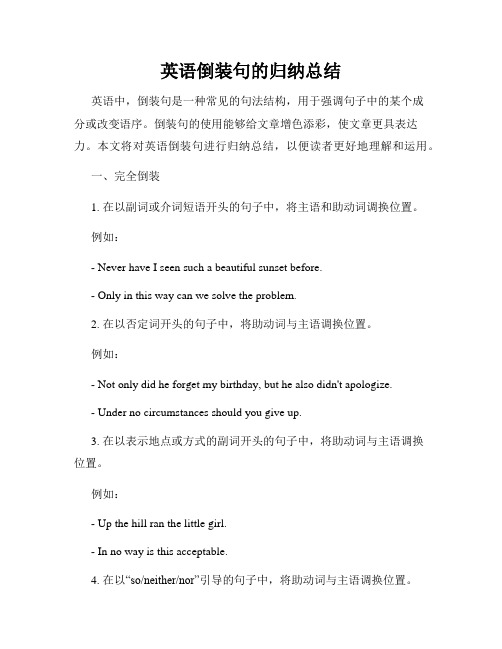
英语倒装句的归纳总结英语中,倒装句是一种常见的句法结构,用于强调句子中的某个成分或改变语序。
倒装句的使用能够给文章增色添彩,使文章更具表达力。
本文将对英语倒装句进行归纳总结,以便读者更好地理解和运用。
一、完全倒装1. 在以副词或介词短语开头的句子中,将主语和助动词调换位置。
例如:- Never have I seen such a beautiful sunset before.- Only in this way can we solve the problem.2. 在以否定词开头的句子中,将助动词与主语调换位置。
例如:- Not only did he forget my birthday, but he also didn't apologize.- Under no circumstances should you give up.3. 在以表示地点或方式的副词开头的句子中,将助动词与主语调换位置。
例如:- Up the hill ran the little girl.- In no way is this acceptable.4. 在以“so/neither/nor”引导的句子中,将助动词与主语调换位置。
例如:- So beautiful is the scenery that it takes my breath away.- Neither have I finished my homework, nor has my brother.二、部分倒装1. 在以“if/whether”引导的条件句中。
例如:- If you work hard, you will achieve your goals.- Whether he comes or not, we will have the party.2. 在以“so that/such that”引导的结果状语从句中。
例如:- He spoke so quickly that I couldn't catch up with him.- The problem is such that it requires a professional to solve it.3. 在以“as/though”引导的方式状语从句中。
句子结构分析方法总结大全

句子结构分析方法总结大全句子结构分析是语言学和语法学中的重要研究内容,它对于理解和描述语言的语法规则以及句子的意思起着至关重要的作用。
本文将介绍几种常见的句子结构分析方法,包括树状图分析法、成分分析法、功能分析法和链式分析法,以及它们各自的特点和适用场景。
一、树状图分析法树状图分析法是一种经典且常用的句子结构分析方法,它通过绘制一棵树状图来表示句子中各个成分之间的关系。
这种方法的优点在于能够直观地展示句子的结构和成分之间的依存关系,有助于帮助读者更好地理解句子的意思。
树状图分析法通常采用自顶向下的分析方式,先确定句子的主干,再逐步添加修饰成分,最终形成完整的句子结构。
二、成分分析法成分分析法是一种基于句子成分的分析方法,它将句子划分为更小的成分单位,并通过分析这些成分在句子中的功能和作用来推断句子的整体结构。
主要的成分包括主语、谓语、宾语、定语、状语等,通过分析这些成分的出现位置和句法关系,可以确定句子的结构和句子成分之间的依存关系。
成分分析法适用于具有明显成分的句子,可以帮助读者更好地理解句子的意思和语法规则。
三、功能分析法功能分析法是一种基于句子功能的分析方法,它关注句子中不同成分的功能和作用,通过分析这些功能来推断句子的结构。
功能分析法主要关注句子成分的语义角色和作用,如主语的主动性或被动性、宾语的指代对象等。
通过分析这些功能,可以确定句子的整体结构和不同成分之间的关系。
功能分析法适用于具有明确功能的句子,可以帮助读者更加准确地理解句子的意思和信息传递。
四、链式分析法链式分析法是一种基于链式关系的分析方法,它通过识别句子中的核心词语和从属词语,并通过它们之间的链式关系来推断句子的结构。
核心词通常是表示动作或状态的词语,而从属词语则是对核心词进行补充或修饰的词语。
通过识别核心词和从属词,并将它们按照链式关系连接起来,可以构建出句子的结构。
链式分析法适用于复杂句和长句的分析,可以帮助读者更好地理解句子的逻辑和结构。
语文句法知识点总结
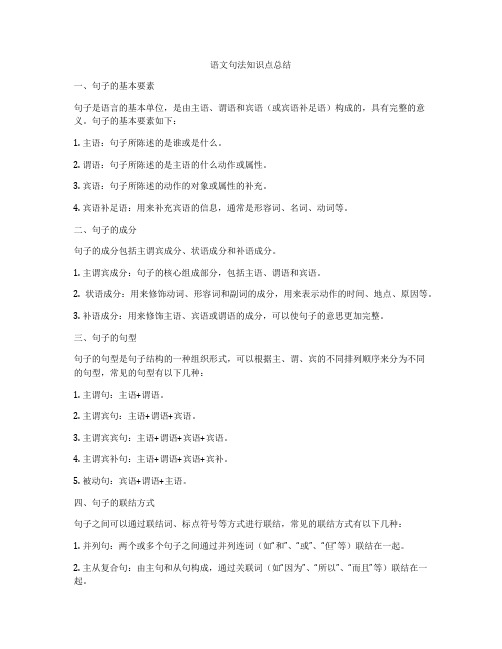
语文句法知识点总结一、句子的基本要素句子是语言的基本单位,是由主语、谓语和宾语(或宾语补足语)构成的,具有完整的意义。
句子的基本要素如下:1. 主语:句子所陈述的是谁或是什么。
2. 谓语:句子所陈述的是主语的什么动作或属性。
3. 宾语:句子所陈述的动作的对象或属性的补充。
4. 宾语补足语:用来补充宾语的信息,通常是形容词、名词、动词等。
二、句子的成分句子的成分包括主谓宾成分、状语成分和补语成分。
1. 主谓宾成分:句子的核心组成部分,包括主语、谓语和宾语。
2. 状语成分:用来修饰动词、形容词和副词的成分,用来表示动作的时间、地点、原因等。
3. 补语成分:用来修饰主语、宾语或谓语的成分,可以使句子的意思更加完整。
三、句子的句型句子的句型是句子结构的一种组织形式,可以根据主、谓、宾的不同排列顺序来分为不同的句型,常见的句型有以下几种:1. 主谓句:主语+谓语。
2. 主谓宾句:主语+谓语+宾语。
3. 主谓宾宾句:主语+谓语+宾语+宾语。
4. 主谓宾补句:主语+谓语+宾语+宾补。
5. 被动句:宾语+谓语+主语。
四、句子的联结方式句子之间可以通过联结词、标点符号等方式进行联结,常见的联结方式有以下几种:1. 并列句:两个或多个句子之间通过并列连词(如“和”、“或”、“但”等)联结在一起。
2. 主从复合句:由主句和从句构成,通过关联词(如“因为”、“所以”、“而且”等)联结在一起。
3. 同位语句:由两个或多个语法意义相同的句子并列在一起,用逗号或顿号进行分隔。
五、句子的修辞手法句子的修辞手法是表达作者思想感情、增强语言表现力的一种方式,常见的修辞手法有以下几种:1. 比喻:用一个事物的特性来说明另一个事物的含义,使表达更加形象、生动。
2. 拟人:赋予无生命的事物以人的特征和能力,以增强表现力。
3. 对比:通过对相互对立的事物进行对照,以突出所要表达的观点。
4. 排比:通过词语、句子的重复来加强语言的力度和节奏感。
初中英语语法思维导图总结 - 句法之疑问句,感叹句,祈使句和陈述句
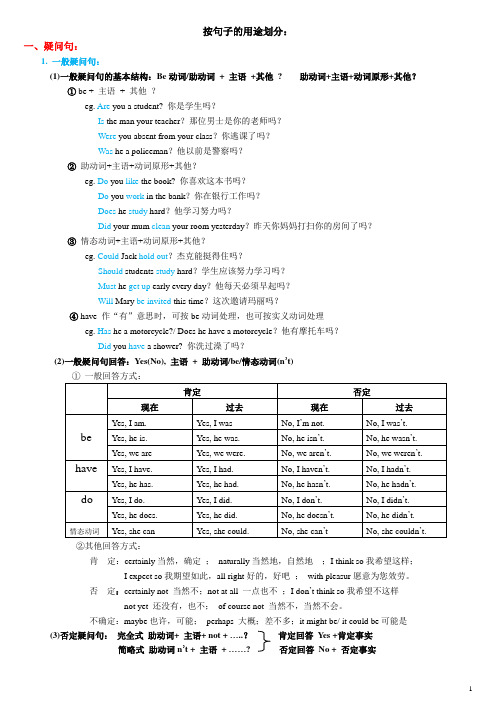
按句子的用途划分:一、疑问句:1. 一般疑问句:(1)一般疑问句的基本结构:Be动词/助动词+ 主语+其他? 助动词+主语+动词原形+其他?①be + 主语+ 其他?eg. Are you a student? 你是学生吗?Is the man your teacher?那位男士是你的老师吗?Were you absent from your class?你逃课了吗?Was he a policeman?他以前是警察吗?②助动词+主语+动词原形+其他?eg. Do you like the book? 你喜欢这本书吗?Do you work in the bank?你在银行工作吗?Does he study hard?他学习努力吗?Did your mum clean your room yesterday?昨天你妈妈打扫你的房间了吗?③情态动词+主语+动词原形+其他?eg. Could Jack hold out?杰克能挺得住吗?Should students study hard?学生应该努力学习吗?Must he get up early every day?他每天必须早起吗?Will Mary be invited this time?这次邀请玛丽吗?④have 作“有”意思时,可按be动词处理,也可按实义动词处理eg. Has he a motorcycle?/ Does he have a motorcycle?他有摩托车吗?Did you have a shower? 你洗过澡了吗?(2)一般疑问句回答:Yes(No), 主语+ 助动词/be/情态动词(n’t)②其他回答方式:肯定:certainly当然,确定;naturally当然地,自然地;I think so我希望这样;I expect so我期望如此,all right好的,好吧;with pleasur愿意为您效劳。
否定:certainly not 当然不;not at all 一点也不;I don’t think so我希望不这样not yet 还没有,也不;of course not 当然不,当然不会。
倒装句语法知识点归纳总结
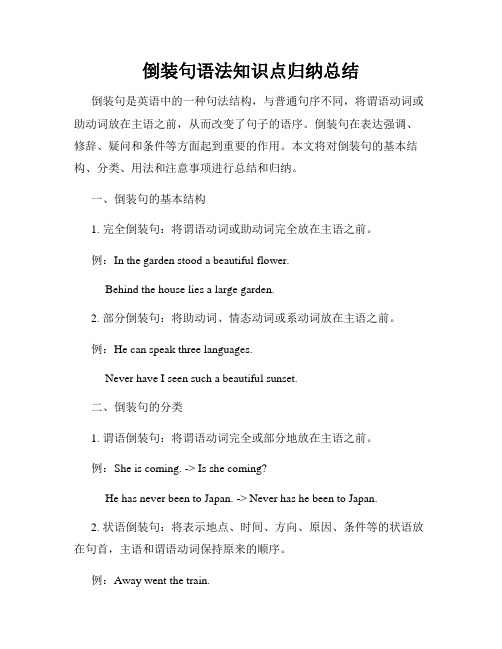
倒装句语法知识点归纳总结倒装句是英语中的一种句法结构,与普通句序不同,将谓语动词或助动词放在主语之前,从而改变了句子的语序。
倒装句在表达强调、修辞、疑问和条件等方面起到重要的作用。
本文将对倒装句的基本结构、分类、用法和注意事项进行总结和归纳。
一、倒装句的基本结构1. 完全倒装句:将谓语动词或助动词完全放在主语之前。
例:In the garden stood a beautiful flower.Behind the house lies a large garden.2. 部分倒装句:将助动词、情态动词或系动词放在主语之前。
例:He can speak three languages.Never have I seen such a beautiful sunset.二、倒装句的分类1. 谓语倒装句:将谓语动词完全或部分地放在主语之前。
例:She is coming. -> Is she coming?He has never been to Japan. -> Never has he been to Japan.2. 状语倒装句:将表示地点、时间、方向、原因、条件等的状语放在句首,主语和谓语动词保持原来的顺序。
例:Away went the train.In the distance could be seen a tall tower.3. 主从倒装句:主句和从句中的主语-谓语结构进行倒装。
例:Not until she finished her homework did she go to bed.Only when the rain stopped could we go outside.三、倒装句的用法1. 强调句:通过倒装句,可以将句子的某一部分进行强调,常用的结构是完全倒装句和部分倒装句。
例:Not only did he win the game, but he also broke the record.Under no circumstances should you touch the red button.2. 疑问句:直接将谓语动词或助动词放在主语之前形成疑问句。
语法句法知识点总结
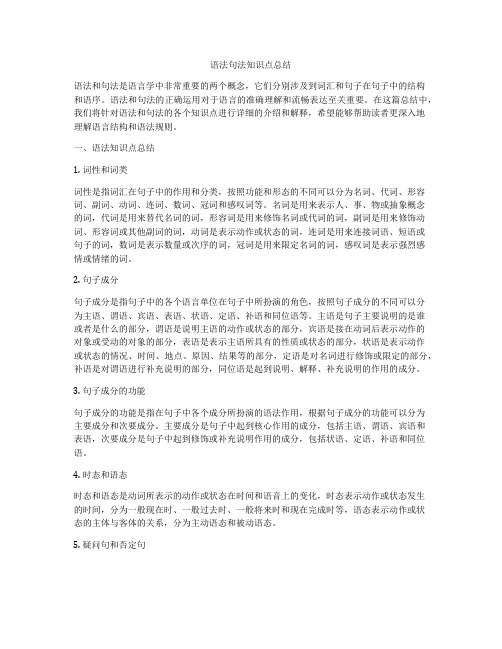
语法句法知识点总结语法和句法是语言学中非常重要的两个概念,它们分别涉及到词汇和句子在句子中的结构和语序。
语法和句法的正确运用对于语言的准确理解和流畅表达至关重要。
在这篇总结中,我们将针对语法和句法的各个知识点进行详细的介绍和解释,希望能够帮助读者更深入地理解语言结构和语法规则。
一、语法知识点总结1. 词性和词类词性是指词汇在句子中的作用和分类,按照功能和形态的不同可以分为名词、代词、形容词、副词、动词、连词、数词、冠词和感叹词等。
名词是用来表示人、事、物或抽象概念的词,代词是用来替代名词的词,形容词是用来修饰名词或代词的词,副词是用来修饰动词、形容词或其他副词的词,动词是表示动作或状态的词,连词是用来连接词语、短语或句子的词,数词是表示数量或次序的词,冠词是用来限定名词的词,感叹词是表示强烈感情或情绪的词。
2. 句子成分句子成分是指句子中的各个语言单位在句子中所扮演的角色,按照句子成分的不同可以分为主语、谓语、宾语、表语、状语、定语、补语和同位语等。
主语是句子主要说明的是谁或者是什么的部分,谓语是说明主语的动作或状态的部分,宾语是接在动词后表示动作的对象或受动的对象的部分,表语是表示主语所具有的性质或状态的部分,状语是表示动作或状态的情况、时间、地点、原因、结果等的部分,定语是对名词进行修饰或限定的部分,补语是对谓语进行补充说明的部分,同位语是起到说明、解释、补充说明的作用的成分。
3. 句子成分的功能句子成分的功能是指在句子中各个成分所扮演的语法作用,根据句子成分的功能可以分为主要成分和次要成分。
主要成分是句子中起到核心作用的成分,包括主语、谓语、宾语和表语,次要成分是句子中起到修饰或补充说明作用的成分,包括状语、定语、补语和同位语。
4. 时态和语态时态和语态是动词所表示的动作或状态在时间和语音上的变化,时态表示动作或状态发生的时间,分为一般现在时、一般过去时、一般将来时和现在完成时等,语态表示动作或状态的主体与客体的关系,分为主动语态和被动语态。
初中英语句法基础知识大全
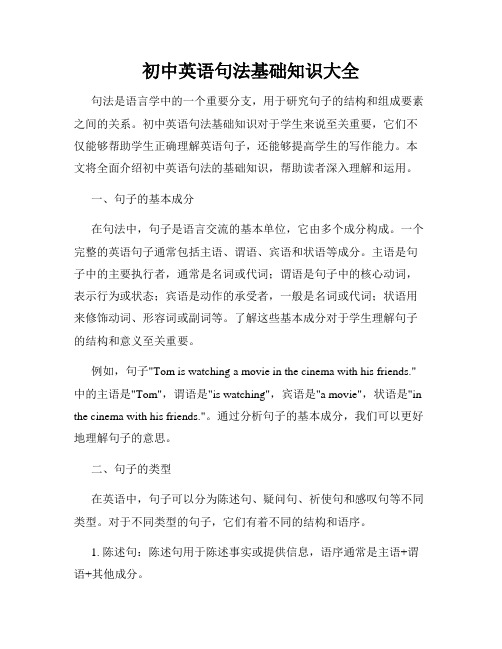
初中英语句法基础知识大全句法是语言学中的一个重要分支,用于研究句子的结构和组成要素之间的关系。
初中英语句法基础知识对于学生来说至关重要,它们不仅能够帮助学生正确理解英语句子,还能够提高学生的写作能力。
本文将全面介绍初中英语句法的基础知识,帮助读者深入理解和运用。
一、句子的基本成分在句法中,句子是语言交流的基本单位,它由多个成分构成。
一个完整的英语句子通常包括主语、谓语、宾语和状语等成分。
主语是句子中的主要执行者,通常是名词或代词;谓语是句子中的核心动词,表示行为或状态;宾语是动作的承受者,一般是名词或代词;状语用来修饰动词、形容词或副词等。
了解这些基本成分对于学生理解句子的结构和意义至关重要。
例如,句子"Tom is watching a movie in the cinema with his friends."中的主语是"Tom",谓语是"is watching",宾语是"a movie",状语是"in the cinema with his friends."。
通过分析句子的基本成分,我们可以更好地理解句子的意思。
二、句子的类型在英语中,句子可以分为陈述句、疑问句、祈使句和感叹句等不同类型。
对于不同类型的句子,它们有着不同的结构和语序。
1. 陈述句:陈述句用于陈述事实或提供信息,语序通常是主语+谓语+其他成分。
例如,句子"The sun rises in the east."是一个陈述句,它通过主语"the sun"和谓语"rises"陈述了一个事实。
2. 疑问句:疑问句用于询问问题,语序通常是疑问词/助动词+主语+谓语+其他成分。
例如,句子"Do you like playing football?"是一个疑问句,它通过助动词"do"、主语"you"和谓语"like playing"询问对方的爱好。
句法总结与练习

句法总结与练习陈述句:说明事实与陈述人的看法的句子,包括肯定与否定形式。
练习:把下列各词连成陈述句1.see, a map, can, I, the, wall, on2.does, often, the go, Lucy, park, not, to3.right, he, I, think, is, don’t4.not, have, yet, work, the, they, finished.5.the, exam, Chinese, Jim, fail, in, may一般疑问句:1.be动词,助动词,情态动词前移至句首,并用Yes和No回答。
2.读升调,答句用降调。
练习:将下列句子变成一般疑问句,并做肯定与否定回答。
1.They are playing basketball on the playground.2.They can borrow books from the library.3.He has many English novels in his family.4.They go to school on foot every day.5.His father went to France last year.6.We have made a lot of beautiful clothes these days.7.He has finished his homework.8.I will pass on a messge to her.9.I would like a cup of milk, please.10.We have many cakes for supper. (变为否定疑问句)11.It is a wonderful skirt. (变为否定疑问句)12.I want to come with you. (变为否定疑问句)13.I told you to come earlier. (变为否定疑问句)14.I have been to Dalian three times. (变为否定疑问句)15.We were watching TV at this time last night.16.He must stop smoking.17.Tom and Jerry are playing with a ball.18.She had finished her homework when her mother got home.19.I have had lunch with Tom today.20.The peasants are getting ready for the next year.特殊疑问句:1.一般情况:疑问词+一般疑问句2.疑问词在句中充当成分。
初中语文句式语法归纳总结

初中语文句式语法归纳总结在初中语文学习中,句式和语法的掌握是非常重要的。
通过对句式和语法的归纳总结,我们可以更好地理解语言的运用和表达,提升写作和阅读能力。
下面是初中语文句式语法的归纳总结:一、基本句式结构1. 主语+谓语:句子的最基本结构,用于陈述一个事实或情况。
例如:“他跑步去学校。
”2. 主语+谓语+宾语:表达动作的施与受。
例如:“我喜欢读书。
”3. 主语+谓语+宾语+宾补:进一步补充宾语的信息。
例如:“他认为她很聪明。
”4. 主语+系动词+表语:表示主语的状态或性质。
例如:“她是一个好老师。
”二、常见句式变换1. 陈述句→疑问句:将句子的语序调整,加入疑问词或倒装。
例如:“你参加了比赛吗?”2. 疑问句→陈述句:回答疑问句时,将疑问句的语序转为陈述句。
例如:“是的,我参加了比赛。
”3. 陈述句→祈使句:表示命令或请求,去掉主语,谓语动词用原形。
例如:“请你关门。
”4. 祈使句→陈述句:将祈使句的语序转为陈述句。
例如:“我要请你关门。
”5. 陈述句→感叹句:用感叹词和感叹句式表达强烈的情感或意义。
例如:“多么美丽的花啊!”6. 感叹句→陈述句:将感叹句的语序转为陈述句。
例如:“那朵花真美丽。
”三、常用句式1. 并列句:用连词连接两个意思相对独立的句子,表示并列、递进或选择关系。
例如:“我喜欢吃苹果,也喜欢吃橙子。
”2. 转折句:用转折连词表示前后内容的对比、转折或否定关系。
例如:“虽然天气很热,但我还是出去跑步了。
”3. 条件句:用条件连词表示条件关系。
例如:“如果你努力学习,就会取得好成绩。
”4. 选择句:用选择连词表示选择关系。
例如:“要么你跟我一起去,要么你一个人在家。
”5. 定语从句:用关系代词或关系副词引导的从句,修饰前面的名词或代词。
例如:“我喜欢读的那本书很有趣。
”6. 状语从句:用连词引导的从句,表示时间、地点、原因、目的、程度等状况。
例如:“因为下雨,所以我没有去公园。
”四、句法结构1. 主谓结构:句子中最基本的结构,由主语和谓语构成。
中考句法知识点总结归纳

中考句法知识点总结归纳句法又称句子成分,是对句子结构和成分的研究。
句法知识对于语法学习至关重要,它涉及词语在句子中的位置、作用和关系,对于理解句子意思和正确表达思想起着至关重要的作用。
下面我们将对中考中常见的句法知识点进行总结归纳,希望对大家中考复习有所帮助。
一、句子的基本成分1. 主谓结构句子的核心是由主语和谓语构成的,主语通常是句子的主题,谓语说明主语的动作或状态。
例句:小明在做作业。
主语:小明谓语:在做2. 主谓宾结构在主谓结构的基础上,加上宾语,构成主谓宾结构。
例句:小明吃苹果。
主语:小明谓语:吃宾语:苹果3. 主谓宾宾结构在主谓宾结构的基础上,加上间接宾语,构成主谓宾宾结构。
例句:妈妈给小明买书。
主语:妈妈谓语:给宾语:书间接宾语:小明二、句子的修饰成分1. 定语定语是对名词或代词进行修饰的成分,表明其特征或属性。
例句:我喜欢的那本书很有趣。
定语:我喜欢的2. 状语状语是对动词、形容词、副词或整个句子进行修饰的成分,表明其时间、地点、方式、原因等。
例句:他很快地跑回了家。
状语:很快地3. 表语表语是谓语的补充成分,说明主语的状态、特征或身份。
例句:小明是一个好学生。
表语:好学生4. 宾语补足语宾语补足语是对宾语进行补充说明的成分,通常由形容词、名词、不定式、分词等构成。
例句:我们把房子打扫干净了。
宾语:房子宾语补足语:打扫干净了三、句子的语序1. 主谓宾语语序中文中常用的句子语序为主谓宾,即主语位于谓语之前,宾语位于谓语之后。
例句:小猫捉到了老鼠。
主语:小猫谓语:捉到了宾语:老鼠2. 谓宾主语语序在一些诗歌和文言文中,常用的句子语序为谓宾主,即谓语位于宾语之前,主语位于谓语之后。
例句:明月出天山,苍茫云海间。
谓语:出宾语:天山主语:明月四、句子的联接成分1. 连词连词是用来表示词与词、短语与短语、句与句之间的关系的虚词。
例句:因为下雨,所以比赛延期了。
连词:因为、所以2. 并列关系并列关系是指两个或多个同等地位的成分并列在一起。
英语:高中句法知识总结

高中句法知识总结句子:简单句结构:一个主语(或有两个以及两个以上的并列主语)+一个谓语(或有两个或两个以上的并列谓语)主系表;主谓;主谓宾;主谓间宾直宾;主谓宾宾补复合句分为并列复合句和主从复合句。
并列复合句指的是用连词连接两个或两个以上的简单句,其结构:为:简单句+并列连词+简单句。
常用并列连词:and, or, but, not only…but also…, either…or…, neither…nor…, so, nor/neither 例如:The spirit is willing, but the flesh is weak.Some are wise and some otherwise.Neither could theory do without practice, nor could practice do without theory.You may lead a horse to the water but you cannot make him drink.主从复合句是由一个主句和一个或一个以上的从句构成的句子。
不同的词类在句子中充当不同的句子成分,以句子的形式充当句子成分的句子既是主从复合句。
既从句在句子中可以充当主语、宾语、表语、同位语、定语和状语。
所以从句可分为名词性从句、定语从句和状语从句三大类。
一、名词性从句名词性从句分为主语从句、表语从句、宾语从句和同位语从句四种。
引导名词性从句的词语有:从属连词:that, whether, if疑问代词:who, which, whose, what疑问副词:when, where, how, why关系代词:what(the things that), whatever(anything that), whoever(anybody who), whichever 1.主语从句以句子的形式在句子中充当主语,例如:That things will improve is obvious.Whether he’s coming (or not) doesn’t matter very much.Who said that is not important.Which one is correct is hard to say.Whose side she is on is not quite clear.What made him do so is a mystery. (what做疑问代词)What matters most is good health. (what做关系代词)When and where the meeting will be held is not yet fixed.How she got wounded at work should be investigated.Why we should develop education is not a question.Whoever said that was lying.Whatever you give is fine with me.Whichever of you gains the most points wins the competition.Notes:a)主语从句前面的that不能省略。
句法全部知识点总结

句法全部知识点总结一、基本句型1. 主谓结构主谓结构是最简单的句子结构,由主语和谓语构成,如:He reads.2. 主谓宾结构主谓宾结构由主语、谓语和宾语构成,如:She eats an apple.3. 主谓宾宾结构主谓宾宾结构由主语、谓语、宾语和宾语构成,如:Tom gave Mary a book.4. 主系表结构主系表结构由主语、系动词和表语构成,如:She is a teacher.5. 主系表宾结构主系表宾结构由主语、系动词、表语和宾语构成,如:They made me their leader.6. 否定句否定句在句子之前加上否定词not,如:She does not like him.7. 疑问句疑问句是用来询问信息的句子,有两种类型:一种是用疑问词开头的特殊疑问句,另一种是用助动词开头的一般疑问句,如:What are you doing? Are you coming?8. 感叹句感叹句用来表达惊讶、喜悦等情感,如:What a beautiful girl she is!二、从句1. 名词性从句名词性从句有三种:主语从句、宾语从句和表语从句。
主语从句用作主语,宾语从句用作宾语,表语从句用作表语。
如:What he said is true.2. 定语从句定语从句用来修饰名词,如:The man who is standing there is my teacher.3. 状语从句状语从句用来表示时间、原因、条件、结果等信息,如:If it rains, we won't go out.三、倒装句1. 完全倒装完全倒装是指将助动词、情态动词或系动词提到句首,如:Here comes the bus.2. 部分倒装部分倒装是指将助动词、情态动词或系动词提到句首,如:Not only did he come, but also he brought gifts.四、虚拟语气1. 虚拟条件句虚拟条件句用来表示假设、愿望等虚拟情况,如:If I were you, I would go.2. 虚拟语气在宾语从句中的应用在宾语从句中,应用虚拟语气表示不太可能发生的情况,如:He suggested that she study harder.以上就是英语语法中的句法知识点总结,句法知识是英语学习的基础,掌握好这些知识点可以帮助我们更加准确地理解和表达信息。
小学英语北京版语法、句法汇总全集

语法总结(一)一•一般疑问句---Do you go to the park on Saturday? - --Yes, I do. /No, I don’t——Do you like cats?——Yes, I do. /No, I don’t---Do you have long arms? - --Yes, I do. /No, I don’t——Do you like spring? ---Yes, I do. /No, I don't (like spring).---Do you like summer? ---Yes, I do. /No, I don't (like summer).---Do you like autumn? ---Yes, I do. /No, I don't (like autumn).---Do you like winter? ---Yes, I do. /No, I don't (like winter).---Do you have a lot of snow in winter? ---Yes, we do. /No, we don't.---Do you have a lot of rain in autumn? ---Yes, we do. /No, we don't.---Do you have a lot of rain in summer? ---Yes, we do. /No, we don't.---Do you have a lot of snow in spring? ---Yes, we do. /No, we don't.---Do you want any sweet potatoes? - --Yes, please.---Do you want any biscuits? - --Yes, please.---Do you want chocolates? - --Yes, please.---Do you want a pancake? ---Yes, please.---Do you want to fly my new kite? - --Yes, I do. /Sorry, I can't.---Do you want to go to the bookstore? - --Yes, I do. /Sorry, I can't.---Do you want to go to the cinema? - --Yes, I do. /Sorry, I can't.---Do you want to go for lunch now? - --Yes, I do. /Sorry, I can't.---Does he come by taxi? - --Yes, he does. /No, he doesn't.---Does he go to the park by subway? ---Yes, he does. /No, he doesn't.---Does he go to the hospital by bus? ---Yes, he does. /No, he doesn't.---Did you go to see your grandparents? ---Yes, I did. /No, I didn't.---Did she return the books? --- Yes, I did. /No, I didn't.---Did they win the football match? --- Yes, I did. /No, I didn't.---Can I have fish and rice, please? ---Yes, here you are.---Can I have fried rice, please? ---Yes, here you are.---Can I have rice noodles, please? ---Yes, here you are.---Can I have a fried egg, please? ---Yes, here you are.---Can I use the bathroom, please? ---Sure. / Sorry you can't.---Can I use the towel, please? ---Sure. / Sorry you can't.---Can I use the soap, please? ---Sure. / Sorry you can't.---Can I use the shampoo, please? ---Sure. / Sorry you can't.---Can I use the toothpaste, please? ---Sure. / Sorry you can't.---Can you play ping-pong with me? ---I'm sorry I can't. /Yes, let's go.---Can you play basketball with me? ---I'm sorry I can't. /Yes, let's go.---Can you go ice-skating with me? ---I'm sorry I can't. /Yes, let's go.---Can you fly a kite with me? ---I'm sorry I can't. /Yes, let's go.---Can you tell me more about Halloween? ---Children dress up at night andknock ondoors for candy.---Can you tell me more about The Dragon Boat Festival? ---People have dragon boat races and eat zongzi.——Can you tell me more about Thanksgiving?——Families get together and eat turkey. ——Can you tell me more about Easter?——Children have an Easter egg hunt. ——Can I open the gift now?——Please do. /Please don't.——Can I have some ice cream now?——Please do. /Please don't.——Can I go home now?——Please do. /Please don't.---Can I go swimming with Maomao now? ---Please do. /Please don't.——Can I borrow your ping-pong bat?——Yes, of course.——Can I borrow your markers?——Yes, of course.——Can I borrow your ruler?——Yes, of course.---Can I borrow your scissors? ---Yes, of course.——Can I borrow your crayons? ---Yes, of course.---Can I borrow your pencil sharpener? ---Yes, of course.---Can I use your computer? ---Sorry. I need to finish my homework first.---Can I open the gift box? ---Sorry. It's not for you.---Can I go out and play? ---Sorry. It's raining outside.---Can I watch the cartoons? ---Sorry. Dad is watching the news.---Would you like to come to my room? ---Yes, we'd love to.---Would you like to read my books? - --Yes, we'd love to.---Would you like to ride my bike? ---Yes, I'd love to.---Would you like to play with my toys? - --Yes, I'd love to.---Would you like to use the glasses? ---No, thank you.---Would you like to use the spoon? ---No, thank you.---Would you like to use the bowl? ---No, thank you.---Would you like to use the chopsticks? - --No, thank you.---Would you please hold these books for me? ---No problem.---Would you please close the window for me? ---No problem.---Would you please turn off the light for me? ---No problem.---Would you please pass me the water for me? ---No problem.---Would you mind opening the door, please? ---Sure. No problem.---Would you mind turning off the radio, please? ---Sure. No problem.---Would you mind turning on the light, please? ---Sure. No problem.---Would you like to come to my house? ---Sorry I can't. I must stay at home.---Would you like to walk the dog? ---Sorry I can't. I must tidy my room.---Is this your jacket? ---Yes, it is. /No, it isn't.---Is this your watch? ---Yes, it is. /No, it isn't.---Is this your cap? - --Yes, it is. /No, it isn't.---Is this your football? ---Yes, it is. /No, it isn't.---Is the second class Chinese? --- Yes, it is. /No, it isn't.---Is the sixth class Maths? - -- Yes, it is. /No, it isn't.---Is the fifth class English? --- Yes, it is. /No, it isn't.---Is the seventh class PE? - -- Yes, it is. /No, it isn't.---Is Guoguo there? ---Sorry, she is not home/here.---Is Sara there? ---Sorry, she is not home/here.---Is Maomao there? ---Sorry, he is not home/here.——Are these your trousers?——Yes, they are. /No, they are not.——Are these your shorts?——Yes, they are. /No, they are not.——Are these your socks?——Yes, they are. /No, they are not.——Are these your shoes?——Yes, they are. /No, they are not.——Are you going to run a race?——Yes, I am. /No, I am not.——Are you going to do the high jump?——Yes, I am. /No, I am not.——Are you going to do the long jump?——Yes, I am. /No, I am not.——Are you going to jump the rope?——Yes, I am. /No, I am not.---Are you going to Chengdu by train? ---No, we are going by plane.---Are you going to the Bird's Nest by car? ---No, we are going by subway.——Are you going to the Summer Palace by bus? ---No, we are going by taxi.---May I borrow your markers, please? ---Here you are.---May I borrow your eraser, please? ---Here you are.---May I borrow your ruler, please? ---Here you are.---May I borrow your books, please? ---Here you are.---May I borrow your pencil, please? ---Here you are.---May I have a cup of milk tea, please? ---Sure.---May I have a cup of black tea, please? ---Sure.---May I have a cup of green tea, please? ---Sure.---May I look at that pair of shoes, please? ---Sure. Here you are.---May I look at that pair of slippers, please? --- Sure. Here you are.---May I look at these boots, please? --- Sure. Here you are.---May I look at these sandals, please? --- Sure. Here you are.---May I look at those sneakers, please? --- Sure. Here you are.---May I take your order now? ---Yes, I'd like/ I'll have a salad, fish, and mushroom soup.---May I take your order now? ---Yes, I'd like/ I'll have a pizza, a glass of juice, and a sandwich. ---Will Dad drive us there? ---Yes, he will.---Will Mike come for dinner? ---Yes, he will.---Will your sister come to see us? ---Yes, she will.---Will you take football lessons? ---Yes, I will. /No, I won't.---Will you take ballet lessons? ---Yes, I will. /No, I won't.---Will you take computer lessons? ---Yes, I will. /No, I won't.---Will you take piano lessons? ---Yes, I will. /No, I won't.---The windows are dirty. Shall we clean them this afternoon? ---Yes, let's.---The bike is broken. Shall we fix it this afternoon? ---Yes, let's.---The plants are dry. Shall we water them this afternoon? ---Yes, let's.二.特殊疑问句---What do you do on Saturday? ---I often go to see a film.——What do you do on Sunday?——I go to the zoo.——What do you collect?——I collect rulers. I have forty.——What do you collect?——I collect crayons. I have thirty.——What do you collect?——I collect cards. I have fifty.——What do you collect?——I collect stickers. I have sixty.——What do you see in spring?——The trees turn green.——What do you see in spring?——The butterflies dance.——What do you see in spring?——The bears wake up.---What do you want to be? - --1 want to be a writer.-—What do you want to be? ---1 want to be a singer.---What do you want to be? ---1 want to be a dancer.---What do you want to be? ---1 want to be a football player.---What does your father do? ---He is a teacher.---What does your father do? ---He is a policeman.---What does your mother do? ---She is a dentist.---What does your father do? ---He is a worker.---What does she wear on stage? ---She wears pretty dresses.---What does he wear at work? ---He wears a suit with a tie.---What does she wear at school? ---She wears formal clothes.---What did you do this summer? ---1 went back to Canada.---What did you do this summer? ---1 wrote a story.---What did you do this summer? ---1 made cakes.---What did you say? ---1 said you should stop eating too much.---What did your father say? ---He said I should stop playing computer games. ---What did the doctor say? ---He said I should stop smoking.---What is your number? ---My number is twelve.---What is (What's) this? ---It is (It's) an elephant.---What is (What's) for breakfast? ---We have bread, milk, eggs, and fruits.---What is (What's) the ninth month in English? ---It's September.---What is (What's) the tenth month in English? ---It's October.---What is (What's) the eleventh month in English? ---It's November.---What is (What's) the twelfth month in English? - --It's October.---What's your favourite food? ---It's jiaozi.---What's your favourite food? ---It's noodles.---What's your favourite food? - --It's fried fish.---What's your favourite food? ---It's meat balls.---What is the date today? ---It's October the thirteenth.---What is the date today? ---It's November the seventeenth.---What is the date today? ---It's November the eighteenth.---What is the date today? ---It's December the twenty-third.---What is the date today? ---It's December the twenty-second.---What is (What's)the weather like today? ---It's sunny.---What is (What's)the weather like today? ---It's warm.---What is (What's)the weather like today? ---It's cool.---What is (What's)the weather like today? ---It's cold.---What is (What's)the weather like today? ---It's hot.---What is he wearing? ---He is wearing a blue suit with a silver tie.---What is she wearing? ---She is wearing a denim skirt.---What is she wearing? ---She is wearing jeans.---What is he wearing? ---He is wearing a hoody.---What is she wearing? ---She is wearing pajamas.---What's your favourite game? ---It's rugby.---What's your favourite game? ---It's tennis.---What's your favourite game? ---It's badminton.---What's your favourite game? ---It's ice hockey.---What's your favourite game? ---It's basketball.---What's your favourite game? ---It's baseball.---What's your favourite game? ---It's volleyball.---What's your watch like? ---It's square, and It's black.---What's your box like? ---It's round, and it's red.---What's your clock like? ---It's round, and it's pink.---What's your eraser like? ---It's square, and it's green.---What shapes do you see in the house? ---1 see a triangle.---What shapes do you see in the bus? - --1 see two circles.---What shapes do you see in the ship? ---1 see five rectangles.---What size do you wear? ---1 wear a Medium and she wears a Large.---What size do you wear? ---1 wear a 34 and he wears a 42.---What size do you wear? ---1 wear an XS and she wears a XL.---What are you going to do this afternoon? ---We are going to plant trees.---What are you going to do this morning? ---We are going to make a cake.---What are they going to do today? ---They are going to see the monkeys at the zoo.---What are they going to do this evening? ---They are going to make a card.---What are you doing? ---I'm making a card.---What are you doing? ---I'm playing a game.---What are you doing? ---I'm listening to music.---What are you good at? - --We are good at ice sports.---What are you good at? ---We are good at table tennis.---What are you good at? ---We are good at diving.---What time are we going to leave? ---We are going to leave at 7:30.---What time are we going to get up? - --We are going to get up at 6:30.---What time are we going to have breakfast? ---We are going to have breakfast at 7:00.---What time are we going to visit the palace? ---We are going to visit the palace at 8:30. ——What time are we going to meet at the gate?——We are going to meet at the gate at 12:00. ——What time are we going to have lunch?——We are going to have lunch at 12:30.——What time are we going to leave for the museum?——We are going to leave for the museum at 13:30. ——What time are we going to have dinner?——We are going to have dinner at 17:30.——What time are we going to leave for the show?——We are going to leave for the show at 18:30.——What time are we going to get back to the hotel?——We are going to get back to the hotel at 21:30. ——What would you like to eat?——I'd like some vegetables.---What would you like to eat? ---I'd like some meatballs.——What would you like to have?——I'd like Peking Duck.——What would you like to have?——I'd like some jiaozi.---What would you like to drink? ---I'd like a glass of soy milk.——What would you like to drink? ---I'd like a glass of orange juice.---What will you do in Sichuan? ---1 will visit Du-jiang-yan.---What will you do in Shandong? ---1 will visit Mount Tai.---What will you do in Tibet? ---1 will visit the Potala Palace.---What will you do in Gansu? ---1 will visit the Mogao Caves.---What happened to you? ---1 hurt my right leg.---What happened to you? ---My cat scratched me.---What happened to you? ---1 broke my arm.---How many pigs do you have on your farm? - --1 have sixteen pigs.---How many girls do you have in your class? - --We have nineteen girls.---How many seasons are there in a year? ---There are four.---How many days are there in a week? - --There are seven.---How many hours are there in a day? ---There are twenty-four.---How many stars are there? ---There are five yellow stars, one big star and four small ones.---How many pencils are there? ---There are five pencils, three long pencils and two short ones.---How many cats are there? ---There are four cats, one big cat and three small ones.---How many monkeys are there? ---There are three monkeys, one old monkey and two young ones.---How many medals did the Chinese athletes win? ---They won 51 gold medals, 21 silver medals, and 28 bronze medals.---How many shirts did he buy? ---He bought three shirts.---How many books did she borrow? ---She borrowed six books.---How much is it? ---It's sixty-nine yuan. ---Here is the money. ---Here is your change.---How much is it? ---It's eight yuan. ---Here is the money. ---Here is your change.---How much is it? ---It's three yuan. ---Here is the money. ---Here is your change.---How much is it? ---It's twenty yuan. ---Here is the money. ---Here is your change.---How old are you? ---I am(I'm) eight.---How 01d is your girl? - --She is eight.---How old is he? ---He is eight.---How often does each animal come around? - --Every twelve years.---How often does the girl go to the dentist? - --Every six months.---How often does the boys practice together? - --Every three days.——How is the weather in Sydney?——Bad. It's raining.---How is the weather in Kunming? ---Fine. The sun is shining.---How is the weather in Alaska? ---Cold. It's snowing.——How does your dad go to work? - --He goes to work by car.---How does your mum go to work? ---She goes to work by taxi.---How does Lingling go to see her grandparents? ---She goes to see them by subway.---How do you go to school? ---I go to school by bus.---How do you go to the cinema? ---1 go to the cinema by bike.---How do you go to the zoo? ---I go to the zoo on foot.---How did you go to Hangzhou? ---We went there by air.---How did you go to the Spring Festival Fair? ---We went there on foot.---How did you go to the train station? ---We went there by taxi.---How did you go to Shanghai? ---We went there by train.---1 will dance. How about you? ---1 will play the piano.---1 will play the drum. How about you? ---1 will do magic tricks.---When do you go home? ---At five thirty.---When do you get up? - --At sixty thirty.---When do you go to school? ---At seven thirty.---When do you go to bed? ---At nine thirty.---When did you came back? ---1 came back last Thursday.---When did he go to the airport? ---He went to the airport last Monday morning.---When did she finish the piano lessons? ---She finished the piano lessons last week.---When is Teachers' Day? ---It's September the tenth.---When is Thanksgiving? ---It's in November.---When is Halloween? ---It's in October.---When is Christmas? ---It's in December.---When is New Year's Day? ---It's in January.---When is Kevin's birthday? ---It's September the eighth.---When is Susan's birthday? ---It's September the ninth.---When is your birthday? ---It's in March.---When is your birthday? ---It's in April.---When is your birthday? ---It's in May.---When is your birthday? ---It's in June.---When is your birthday? ---It's in July.---When is your birthday? ---It's in August.---When is the Mid-Autumn Festival? ---It's on the fifteenth day of the eighth month in the Chinese calendar. ---When is the Double Ninth Festival? ---It's on the ninth day of the ninth month in the Chinese calendar.---When is the Lantern Festival? ---It's on the fifteenth day of the second month in the Chinese calendar.---When is the Dragon Boat Festival? ---It's on the fifth day of the fifth month in the Chinese calendar.---When was Grandma born? ---She was born on June 15th.---When was Grandpa born? ---He was born on February 9th.---When was mother born? ---She was born on August 14th.---When was father born? ---He was born on July 29th.---When did the ancient Olympic Games begin? ---They began in 776BC.——When did the Qin Dynasty begin?——It began in 221BC.——When did the Tang Dynasty begin?——It began in 618AD.——When did people hold the first modern Olympics?——They held them in 1896 in Athens.---When did people hold the 29th modern Olympics? ---They held them in 2008 in Beijing.——When did people hold the 30th modern Olympics?——They held them in 2012 inLondon. ---Where is my shirt? ---It's under the bed.——Where is my coat? ---It's behind the sofa.---Where is my cap? ---It's on the desk.---Where is my dress? - --It's in the box.---Where is the UK? ---It's in Europe.---Where is China? ---It's in Asia.---Where is the USA? ---It's North America.---Where is Australia? ---It's in Oceania.---Where is Canada? ---It's in North America.---Where is Russia? ---It's in Asia.---Where is Ottawa? ---It's in the east of the country.---Where is Shanghai? --- It's in the east of the country.---Where is Lhasa? ---It's in the west of the country.---Where is Hohhot? ---It's in the north of the country.---Where is Guangzhou? ---It's in the south of the country.---Where are you from? ---I'm from New York in the USA.---Where are you from? ---I'm from Toronto in Canada.---Where are you from? ---I'm from Sydney in the Australia.---Where does he live? ---He lives on a farm.---Where does he live? - --He lives in the forest.---Where does he live? ---He lives by the lake.---Where does he live? ---He lives on the grassland.---Where does he live? ---He lives in the mountains.---Where did you go last weekend? ---We flew to Hangzhou.---Where did you go yesterday afternoon? ---We drove to Xiangshan.---Where did you go on Friday morning? ---We took the train to Tianjin.---Which season do you like? ---1 like spring. I can fly a kite.---Which season do you like? ---1 like summer. I can go camping.---Which season do you like? ---1 like autumn. I can pick apples.---Which season do you like? ---1 like winter. I can play in the snow.---Which kind would you like? ---This one looks nice.---Which colour would you like? ---This one looks nice.---Which shape would you like? ---This one looks nice.---Which animal was the first of the twelve? - --It was the rat.---Which season is the first of the four? ---It is spring.---Which month is the first of the year? ---It is January.——Chicken or fish, which do you like better? ——I like fish better.——Sandwiches or hamburgers, which do you like better?——I like hamburgers better. ——Donuts or cupcakes, which do you like better? ——I like cupcakes better.---Milk shake or apple juice, which do you like better? ---1 like apple juice better.---Which class do you like best? ---1 like English best. I do best in English.---Which class do you like best? ---1 like English PE. I do best in PE.---Which class do you like best? ---1 like Chinese best. I do best in Chinese.---Which class do you like best? ---1 like calligraphy best. I do best in calligraphy. ---Which class do you like best? - --1 like science best. I do best in science.---Which class do you like best? - --1 like art best. I do best in art.---Why are you so happy? ---Because we are back at school.---Why are you upset? - --Because my new watch is missing.---Why are you worried? ---Because my English book is missing.---Why are you sad? ---Because my new football is missing.---Why is she so angry? - --Because the room is messy.---Why is he so tired? ---Because he played too hard.---Why do you look so sad? ---Because my dog is missing.---Why does he look so surprised? ---Because the gold is missing.---Why do they look so excited? - --Because they will go to the zoo.---Why did you stand on your head? ---Because I wanted to practice kungfu.---Why did she cry? ---Because she fell.---Why did you go to hospital? ---Because I cut my finger.---Who invented those vehicles? ---Some smart people did.---Who invented the plane? ---The Wright brothers did.---Who invented the telephone? ---Mr. Bell did.。
句法总结归纳

句法总结归纳句法是语言学中的一个重要分支,研究的是句子的结构和语法规则。
恰当的句法结构可以使语言表达更加准确、流畅。
本文将对句法的基本概念和常见结构进行总结和归纳。
一、句法的基本概念句法是研究句子内部结构和成分之间关系的学科,它探究的对象是句子。
句子是语言中最基本的语法单位,具有完整的意义,能够独立表达一个思想。
句法研究的主要内容包括句子的句子构成成分和句子成分之间的结构关系。
二、句子成分的分类1. 主语(Subject):主语是句子中起主导作用的成分,通常回答“谁?”。
2. 谓语(Predicate):谓语是句子中表示动作、状态或存在的核心成分,通常回答“做什么?”。
3. 宾语(Object):宾语是句子中受动作影响的成分,通常回答“怎样?”或“接受了什么?”。
4. 补语(Complement):补语是对主语和宾语进行补充说明或限定的成分,包括形容词补语、副词补语、名词性补语等。
5. 状语(Adverbial):状语是句子中修饰动词、形容词、副词等成分,用于表示时间、地点、方式、原因等信息。
6. 定语(Attributive):定语是句子中修饰名词或代词的成分,用于限定或描述名词的属性。
三、常见句法结构1. 简单句:由一个主语和一个谓语构成的句子,可以是陈述句、疑问句、祈使句等形式。
例:他在跑步。
(陈述句)你会吗?(疑问句)别做傻事!(祈使句)2. 并列句:由两个或多个并列的主谓结构构成,主要通过连接词(如“和”、“或”、“而且”)或标点符号来连接。
例:他喜欢篮球,她喜欢足球。
我要吃苹果,而且要喝牛奶。
3. 复合句:由一个主句和一个或多个从句构成,从句起修饰或补充主句的作用。
常见的从句有名词性从句、定语从句和状语从句。
例:她告诉我,她会来参加聚会。
(名词性从句)我喜欢那个穿红衣服的女孩。
(定语从句)他成功了,因为他一直努力。
(状语从句)四、常见句法错误1. 主谓不一致:主语和谓语在人称和数上不保持一致。
句法知识点总结

句法知识点总结1. 句子成分句子成分是组成句子的各种语言元素,它们包括主语、谓语、宾语、状语、定语、补语等。
主语是句子中表示动作或状态的行为主体,它通常位于句子的最前面。
谓语是句子中表示动作或状态的部分,宾语是动作的对象,状语是动作或状态发生的时间、地点、方式、原因等。
定语是修饰名词或代词的成分,补语是用来补充说明主语或宾语的成分。
2. 句子模式句子模式是指句子的结构方式,根据成分的不同,可以分为简单句、并列句、复合句等。
简单句由一个主谓结构组成,表示一个完整的意思。
并列句由两个或多个简单句用连词连接而成。
复合句由一个主句和一个或多个从句组成,从句可以是名词从句、形容词从句或副词从句。
3. 语法关系语法关系是指成分之间的关系,包括主谓关系、动宾关系、定状关系等。
主谓关系是主语和谓语之间的关系,动宾关系是动词和宾语之间的关系,定状关系是定语和被修饰成分之间的关系。
4. 句法结构句法结构是指句子中各个成分的排列顺序和联系方式。
在英语中,通常采用SVO(主语-谓语-宾语)的语序,但也有例外,比如感叹句常常省略了主语,只有谓语和宾语。
5. 一致性一致性是指句子中各个成分之间的形式和意义相互匹配。
主谓一致要求主语和谓语在人称和数上保持一致,定语和被修饰词在性、数、格上保持一致。
6. 平行结构平行结构是指句子中并列成分之间在结构上的平衡和对称。
在使用并列句和连词时,要求两个并列成分在结构上一致,否则就会造成句子结构不完整,意思不清楚。
7. 修辞手法修辞手法是指利用语言的形式结构来达到一种修辞目的的方法。
比如借助排比、对仗、排比等手法来增加句子的生动性和表现力。
总之,句法知识是语言学习的重要组成部分,掌握了句法知识,能够帮助我们更加准确地理解和使用语言。
希望本文所述的句法知识点能够对读者有所帮助。
语法修辞专题知识点总结

语法修辞专题知识点总结一、句法修辭手法1. 句子結構句子結構是語法修辭的一個重要方面,它主要包括了長短句、疊義句、平行句、反轉句以及省略句等句型。
這些句型的運用能夠使句子的表達更加豐富多樣,增加了語句的表現力。
2. 修辭疑問句修辭疑問句是指用陳述語氣表達疑問的句子。
通常用來表達一種娓娓動人、引人思考的情感。
例如, "難道我不是一個好朋友嗎?"3. 修辭感嘆句修辭感嘆句是指用陳述語氣表達感嘆的句子。
通常用來表達一種悲傷、愁苦、疑慮、驚訝或感嘆等情感。
例如, "這麼好的機會,我居然放棄了!"4. 斷句斷句是語法修辭中很重要的一環,它可以通過讓句子的結構更加清晰明確,使文詞更加通順。
二、語法結構的運用1. 倒裝倒裝是一種在英文修辭中經常用到的手法,它通過改變主語和謂語的位置來達到修辭效果。
例如, "Never have I felt so happy."2. 定語從句定語從句是一種修辭手法,能夠在給句子增加信息的同時,達到豐富語句的效果。
例如,"The book, which was published last year, is very interesting."3. 分詞構句分詞構句是將分詞反覆用作定語或狀語修飾名詞、代詞或動詞的一種語法結構,它能夠使文詞更加具體和生動。
例如, "Walking down the street, I saw a beautiful girl."4. 並列結構並列結構是指在一個句子中使用兩個或多個並列的詞、詞組或句子,使句子的結構更加整齊。
例如, "You can either stay at home or go out for a walk."5. 借與新借與新是指新的表達方式,它能夠通過新的結構和詞語來使語句更加生動和有表現力。
三、語法修辭的運用1. 同音反覆同音反覆是一種常見的語法修辭手法,通過使用相似的聲音或音節,使語句更加抑揚頓挫,更具有節奏感。
词法句法语法总结

词句语法综合词法:名词: 表示某类人或事物的共有的名称, 或某种物质和抽象的名词。
1.个体名词: 表示人或事物的个体。
Car;teacher2.集体名词: 表示一群人或事物的总称。
.family;class1.普通名词分类: 3.物质名词: 表示无法分出个体的物质。
Fire;water;rice4.抽象名词: 表示动作、状态、品质等抽象概念。
Life;happiness;anger2.专有名词: 表示个别的人、团体、地方、机构、或事物的名称。
其中的名词、代词、数词、形容词、副词和动词的首字母必须大写。
China;Smith;the Unite States of America;New York1.可数名词: 表示可以直接以数字计算的名词。
3.可数与不可数: 2.不可数名词: 不可以直接以数字计算的名词。
物质与抽象名词一般为不可数名词。
(如果表示不可数名词的数, 需要在名词前同时加上数词与量词 a little of water)4.名词的数与所有格: 单复数变换和所有格的表示。
冠词: 是虚词, 不能单独使用, 只能放在名词前起限定作用。
不定冠词: a用在以辅音开头的单数名词前;an用在以元音开头的单数名词前。
1.表示某一类人或某一事物中的一个。
2.表示数量“一”, 等于one, 但数的概念没有one强。
3.表示某个、任何一个、每个4.用于固定搭配中。
A cold;a few;a little定冠词: the既可用在可数名词前, 又可用在不可数名词前,1.特指某人或某物, 或指谈话双方都知道的人或物。
2.用在单数名词前表示某一类人或物。
3.表示世界上独一无二的。
4.少部分的专有名词前。
5.用在序数词、形容词最高级或副词的最高级前。
6.用在乐器前。
7.用在形容词前表示一类人。
The poor;the rich;the sick;the dead8.用在一些固定词组中。
In the morning;on the left零冠词: 就是指不用冠词的情况。
四、句子理解方法总结公式表

一、句子理解方法总结(一)抓关键词语讲有些句子的含义时,要先找出关键词语,弄清这些词语的意思,句子的含义也就理解了。
例如“四周黑洞洞的,还不容易碰壁吗”这一句,用“黑洞洞”暗喻旧社会的黑暗,用“碰壁”来比喻人民丝毫没有自由,处处受迫害。
(二)关键分找出关键部分,清这些词语的意思,句子的含义也就理解了。
例如“舟行碧波上,人在画中游”中“人在画中游”是关键部分,意思是说人好像在图画中游玩一样,就好像是进入了一幅连绵不绝的画卷一样,表达了作者对桂林山水的赞美。
(三)弄清修辞意义注意修辞手法,先弄清句子意思,再理解句子内在含义。
例如“为了整个班,为了整个潜伏部队,为了这次战斗的胜利,邱少云像千斤巨石一般,趴在火堆里一动也不动”。
这个句子中运用了两种修辞手法--排比、比喻:排比部分说明了邱少云不动的原因,比喻部分说明了邱少云意志坚强。
(四)联系上下文了解时代背景要联系上下文,注意时代背景来体会言外之意。
这类句子的表面意思好懂,但更深刻的意思就必须结合作者所处的时代,联系上下文才能体会得出来。
(五)引申理解法主要是根据文章的思想内容,透过句子字面上的意思来理解作者的本意。
首先明确句子的含义,并不是字面上的意思,它是蕴涵在句子里,而没有说出来的意思,没有说出来的感情,没有说出来的思想。
(六)问“为什么”法:如《我的战友邱少云》中“我不敢朝他那儿看”但又“忍不住不看”,要探询这是为什么呢?就能体会到:“我”当时心情的矛盾、焦虑和痛苦,既担心年轻的战友会忍受不住烈火的煎熬,又不忍心看着战友牺牲,心情既矛盾又痛苦。
(七)分析法主要是抓住句子的重点词语,体会其中的思想感情。
一篇文章有关键之词、警策之句,拎出关键词句便可牵住全文。
(八)归纳法主要是领会句子中的内容要点,概括出句子所要表达的主要意思。
二、划分文章段落顺序总结(一)按事情的发展顺序划分段落记事文章一般按事情发展的顺序划分段落,即:起因Ⅱ经过Ⅱ结果;或起因/经过/高潮/结果;或起因、经过‖结果;或起因‖经过、结果。
- 1、下载文档前请自行甄别文档内容的完整性,平台不提供额外的编辑、内容补充、找答案等附加服务。
- 2、"仅部分预览"的文档,不可在线预览部分如存在完整性等问题,可反馈申请退款(可完整预览的文档不适用该条件!)。
- 3、如文档侵犯您的权益,请联系客服反馈,我们会尽快为您处理(人工客服工作时间:9:00-18:30)。
重点语法和常用句型1.manage to do解析:manage to do 意思为成功做某事,即经过努力达到了目的,后接动词不定式,不接v-ing,相当于succeed in doing sth。
练习:1) If you manage to get in touch with Mr. Smith, the problem will be solved easily because he is an expert in this field. 如果你设法与Smith先生取得联系,这个问题将会被很容易解决,因为他是这个领域的专家。
2) Do you think you can manage to get us some tickets?_____ 你看能想办法给我们搞几张票吗?2.as…as…解析:1) as...as意为"和……一样",表示同级的比较。
使用时要注意第一个as为副词,第二个as为连词。
其基本结构为:A…+as+ adj./ adv. +as B, 为了避免重复,我们常用that, those和one一类的代词代替as后重复前面出现的名词。
2) 其否定句:A…+not +as +adj./adv +as B.=A…+not +so +adj./adv. +as B,表示A、B两者程度不同,即A不如B那么……。
(翻译)1)On average, it is said, visitors spend only ___ half as much ___ in a day in Leeds(利兹,英国城市)as in London. 据说,游客平均在利兹的花销只有伦敦的一半。
(06年四级真题)2) The land area of China is more than __twenty times larger than that of Japan___.中国的面积超过日本二十倍大。
(四级模拟训练)(改错)1) He is three times old as me.(在old前面加as)____2) The exhibition this time attracted two as many visitors as last time. (把two变成twice)____(填空)The building is four times as high as that one.= The building is three times higher than that one. = The building is four times the height of that one.= The height of the building is four times that of that one.3.When it comes to…解析:when it comes to 意思是“当提到,说到;至于”,相当于concerning。
需要注意的是to是介词,后面如果出现动词需要加v-ing的形式。
练习:1) People will think of vast stretches of fields in a quiet and peaceful atmosphere ___when it comes to life in the countryside.___当提到乡村生活,人们就会想到安静平和气息里的大片田地。
2) Age is no criterion __when it comes to changing your life __ . In fact, change is what keeps us young. 提及改变你的生活,年龄并非标准。
事实上,改变使我们永葆青春。
3) Women are not smarter than man when it comes to emotional intelligence, nor are men smarter than women. 说到情商,女人不比男人更聪明,男人也不比女人更聪明。
4. 部分否定解析:英语中的部分否定主要有如下几种形式:1) all的否定形式:not all……(all ……not)意思为“并非都……(不是所有的都)”Not all men can be masters. = All men cannot be masters.并非人人都能当头头。
2) every的否定形式:not every…(every……not) 意思为“不是每……都”Not every book is educative. = every book is not educative.不是每本书都有教育意义。
Not everyone likes this book。
并非人人都喜欢这本书。
练习:(翻译)1)__Not all birds can fly.__= __All birds can’t fly._=___Some birds can’t fly.__不是所有的鸟都会飞。
2)Speaking of hamburgers not all Americans like them.说及汉堡,并非所有美国人都爱吃。
3) Not all people share the same interests, but we can still make friends with people who do not have our interests. 人的兴趣不尽相同,但我们仍能和那些与我们兴趣不同的人交朋友。
(选择)I agree with most of what you said, but I don’t agree with ___A___.A. everythingB. anythingC. somethingD. nothing5. 动词不定式解析:动词不定式的语法功能是四、六级的常考内容。
不定式在句子中可做主语、表语、宾语、定语、状语和宾语补语。
练习:1)The bank is reported in the local newspaper ___B____ in broad daylight yesterday. (CET4:01-1-63)A. robbedB. to have been robbedC. being robbedD. having been robbed2) Mr. Smith advised us to withdraw _____C______.(CET4:93-1-58)A. so that to get not involvedB. so as to get not involvedC. so as not to get involvedD. so that not to get involved3) The mother didn’t know who __C___ for the broken glass. (CET4:02-1-64)A. blamedB. would blameC. to blameD. be blamed4) __A____ a teacher in a university, it’s necessary to have at least a master’s degree. (CET4:95-1-48)A. To becomeB. BecomeC. One becomesD. One becoming5) With the development in science and technology man can make various flowers __B___ before their time. (CET4:01-6-36) A. be bloomed B. bloom C. bloomed D. blooming6.限定性与非限定性定语从句:限定性定语从句1. that即可代表事物也可代表人,which代表事物;它们在从句中作主语或宾语,that在从句中作宾语时常可省略关系词,which在从句中作宾语则不能省略。
而且,如果which在从句中作“不及物动词+介词”的介词的宾语,注意介词不要丢掉,而且介词总是放在关系代词which的前边,但有的则放在它原来的位置。
2. who和whom引导的从句用来修饰人,分别作从句中的主语和宾语,whom作宾语时,要注意它可以作动词的宾语也可以作介词的宾语3. where是关系副词,用来表示地点的定语从句This is the place where he works.这是他工作的地点4. when引导定语从句表示时间This was the time when he arrived.这是他到达的时间5. whose是关系代词,修饰名词作定语,相当于所修饰成分的前置所有格非限定性定语从句:非限定性定语从句的作用是对所修饰的成分作进一步说明,通常和主句间用逗号隔开,将从句拿掉后其他部分仍可成立。
练习:1)I've never been to Beijing, but it is the place ___. (99/06/55)A)that I want to visit it most B) where I'd like to visitC) in which I'd like to visit D) I most want to visit D) 题意:我从未去过北京,但它是我最想参观的地方。
解析:此句的先行词虽为指地点的place,但定语从句中缺宾语,且visit是及物动词,故只能选A。
These people once had fame and fortune; now ____ is left to them is utter poverty. (02/6/61)A) all that C) all which B) all what D) that allB) 题意:这些人一度曾拥有名声和财富,现在剩下的只有贫穷了。
解析:that is left to them作all的定语从句,故选A。
2) 改错:(错)This is the mountain village where I visited last year.(错)I will never forget the days when I spent in the countryside.(对)This is the mountain village (which/that) I visited last year.(对)I"ll never forget the days (which/that) I spent in the countryside.习惯上总把表地点或时间的名词与关系副词where, when联系在一起。
